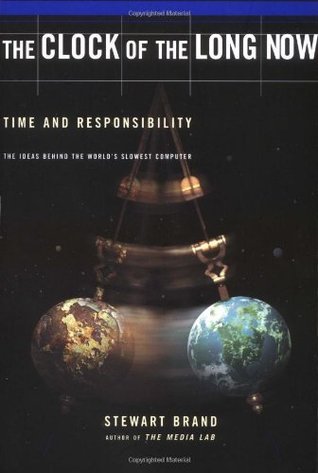
Clock of the Long Now: Time and Responsibility: The Ideas Behind the World's Slowest Computer
by Stewart Brand
12 popular highlights from this book
Key Insights & Memorable Quotes
Below are the most popular and impactful highlights and quotes from Clock of the Long Now: Time and Responsibility: The Ideas Behind the World's Slowest Computer:
The sociologist Elise Boulding diagnosed the problem of our times as “temporal exhaustion”: “If one is mentally out of breath all the time from dealing with the present, there is no energy left for imaging the future.
The mathematician and physicist Freeman Dyson makes a related observation about human society: The destiny of our species is shaped by the imperatives of survival on six distinct time scales. To survive means to compete successfully on all six time scales. But the unit of survival is different at each of the six time scales. On a time scale of years, the unit is the individual. On a time scale of decades, the unit is the family. On a time scale of centuries, the unit is the tribe or nation. On a time scale of millennia, the unit is the culture. On a time scale of tens of millennia, the unit is the species. On a time scale of eons, the unit is the whole web of life on our planet. Every human being is the product of adaptation to the demands of all six time scales. That is why conflicting loyalties are deep in our nature. In order to survive, we have needed to be loyal to ourselves, to our families, to our tribes, to our cultures, to our species, to our planet. If our psychological impulses are complicated, it is because they were shaped by complicated and conflicting demands.
Starting anew with a clean slate has been one of the most harmful ideas in history. It treats previous knowledge as an impediment and imagines that only present knowledge deployed in theoretical purity can make real the wondrous new vision.
Civilization is revving itself into a pathologically short attention span. The trend might be coming from the acceleration of technology, the short-horizon perspective of market-driven economics, the next-election perspective of democracies, or the distractions of personal multitasking. All are on the increase. Some sort of balancing corrective to the short-sightedness is needed—some mechanism or myth that encourages the long view and the taking of long-term responsibility, where “the long term” is measured at least in centuries.
Eternity is the opposite of a long time.
When Brian Eno approached the father of Anthea Norman-Taylor for permission to marry her, he was told, “What you have to ask yourself is, ‘Would I wish this woman to be the grandmother of my grandchildren?
Imagine a world in which time seems to vanish and space becomes completely malleable. Where the gap between need or desire and fulfillment collapses to zero.
More and more I find I want to be living in a Big Here and a Long Now.
How do we make long-term thinking automatic and common instead of difficult and rare? How do we make the taking of long-term responsibility inevitable?
Since the soon-to-be outnumber the living; since the living have greater impact on the unborn than ever before thanks to depletion of natural systems, atmospheric disruption, toxic residue, burgeoning technology, global markets, genetic engineering, and sheer population numbers; since our scientific and historic understandings now comfortably examine processes embracing eons; and now that our plan-ahead horizon has shrunk to five years or less—it would seem that a grave disconnect is in progress. Our everhastier decisions and actions do not respond to our long-term understanding, or to the gravity of responsibility we bear. “The
Reinventing beats inventing nearly every time.
Judaism says, “The Messiah is going to come, and that’s the end of history”; Christianity says, “The Messiah is going to come back, and that’s the end of history”; Islam says, “The Messiah came; history is irrelevant.” One


